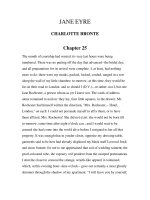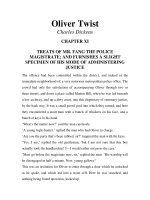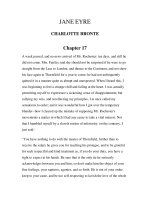LUYỆN ĐỌC TIẾNG ANH QUA TÁC PHẨM VĂN HỌC-VANITY FAIR -WILLIAM MAKERPEACE THACKERAY -CHAPTER 60 ppt
Bạn đang xem bản rút gọn của tài liệu. Xem và tải ngay bản đầy đủ của tài liệu tại đây (24.87 KB, 9 trang )
VANITY FAIR
WILLIAM MAKERPEACE THACKERAY
CHAPTER 60
Returns to the Genteel World
Good fortune now begins to smile upon Amelia. We are glad to get her out
of that low sphere in which she has been creeping hitherto and introduce her
into a polite circle—not so grand and refined as that in which our other
female friend, Mrs. Becky, has appeared, but still having no small
pretensions to gentility and fashion. Jos’s friends were all from the three
presidencies, and his new house was in the comfortable Anglo-Indian district
of which Moira Place is the centre. Minto Square, Great Clive Street,
Warren Street, Hastings Street, Ochterlony Place, Plassy Square, Assaye
Terrace (“gardens” was a felicitous word not applied to stucco houses with
asphalt terraces in front, so early as 1827)—who does not know these
respectable abodes of the retired Indian aristocracy, and the quarter which
Mr. Wenham calls the Black Hole, in a word? Jos’s position in life was not
grand enough to entitle him to a house in Moira Place, where none can live
but retired Members of Council, and partners of Indian firms (who break,
after having settled a hundred thousand pounds on their wives, and retire
into comparative penury to a country place and four thousand a year); he
engaged a comfortable house of a second— or third-rate order in Gillespie
Street, purchasing the carpets, costly mirrors, and handsome and appropriate
planned furniture by Seddons from the assignees of Mr. Scape, lately
admitted partner into the great Calcutta House of Fogle, Fake, and
Cracksman, in which poor Scape had embarked seventy thousand pounds,
the earnings of a long and honourable life, taking Fake’s place, who retired
to a princely park in Sussex (the Fogles have been long out of the firm, and
Sir Horace Fogle is about to be raised to the peerage as Baron Bandanna)—
admitted, I say, partner into the great agency house of Fogle and Fake two
years before it failed for a million and plunged half the Indian public into
misery and ruin.
Scape, ruined, honest, and broken-hearted at sixty-five years of age, went
out to Calcutta to wind up the affairs of the house. Walter Scape was
withdrawn from Eton and put into a merchant’s house. Florence Scape,
Fanny Scape, and their mother faded away to Boulogne, and will be heard of
no more. To be brief, Jos stepped in and bought their carpets and sideboards
and admired himself in the mirrors which had reflected their kind handsome
faces. The Scape tradesmen, all honourably paid, left their cards, and were
eager to supply the new household. The large men in white waistcoats who
waited at Scape’s dinners, greengrocers, bank-porters, and milkmen in their
private capacity, left their addresses and ingratiated themselves with the
butler. Mr. Chummy, the chimney-purifier, who had swept the last three
families, tried to coax the butler and the boy under him, whose duty it was to
go out covered with buttons and with stripes down his trousers, for the
protection of Mrs. Amelia whenever she chose to walk abroad.
It was a modest establishment. The butler was Jos’s valet also, and never
was more drunk than a butler in a small family should be who has a proper
regard for his master’s wine. Emmy was supplied with a maid, grown on Sir
William Dobbin’s suburban estate; a good girl, whose kindness and humility
disarmed Mrs. Osborne, who was at first terrified at the idea of having a
servant to wait upon herself, who did not in the least know how to use one,
and who always spoke to domestics with the most reverential politeness. But
this maid was very useful in the family, in dexterously tending old Mr.
Sedley, who kept almost entirely to his own quarter of the house and never
mixed in any of the gay doings which took place there.
Numbers of people came to see Mrs. Osborne. Lady Dobbin and daughters
were delighted at her change of fortune, and waited upon her. Miss Osborne
from Russell Square came in her grand chariot with the flaming hammer-
cloth emblazoned with the Leeds arms. Jos was reported to be immensely
rich. Old Osborne had no objection that Georgy should inherit his uncle’s
property as well as his own. “Damn it, we will make a man of the feller,” he
said; “and I’ll see him in Parliament before I die. You may go and see his
mother, Miss O., though I’ll never set eyes on her”: and Miss Osborne came.
Emmy, you may be sure, was very glad to see her, and so be brought nearer
to George. That young fellow was allowed to come much more frequently
than before to visit his mother. He dined once or twice a week in Gillespie
Street and bullied the servants and his relations there, just as he did in
Russell Square.
He was always respectful to Major Dobbin, however, and more modest in
his demeanour when that gentleman was present. He was a clever lad and
afraid of the Major. George could not help admiring his friend’s simplicity,
his good humour, his various learning quietly imparted, his general love of
truth and justice. He had met no such man as yet in the course of his
experience, and he had an instinctive liking for a gentleman. He hung fondly
by his godfather’s side, and it was his delight to walk in the parks and hear
Dobbin talk. William told George about his father, about India and
Waterloo, about everything but himself. When George was more than
usually pert and conceited, the Major made jokes at him, which Mrs.
Osborne thought very cruel. One day, taking him to the play, and the boy
declining to go into the pit because it was vulgar, the Major took him to the
boxes, left him there, and went down himself to the pit. He had not been
seated there very long before he felt an arm thrust under his and a dandy
little hand in a kid glove squeezing his arm. George had seen the absurdity
of his ways and come down from the upper region. A tender laugh of
benevolence lighted up old Dobbin’s face and eyes as he looked at the
repentant little prodigal. He loved the boy, as he did everything that
belonged to Amelia. How charmed she was when she heard of this instance
of George’s goodness! Her eyes looked more kindly on Dobbin than they
ever had done. She blushed, he thought, after looking at him so.
Georgy never tired of his praises of the Major to his mother. “I like him,
Mamma, because he knows such lots of things; and he ain’t like old Veal,
who is always bragging and using such long words, don’t you know? The
chaps call him ‘Longtail’ at school. I gave him the name; ain’t it capital? But
Dob reads Latin like English, and French and that; and when we go out
together he tells me stories about my Papa, and never about himself; though
I heard Colonel Buckler, at Grandpapa’s, say that he was one of the bravest
officers in the army, and had distinguished himself ever so much. Grandpapa
was quite surprised, and said, ‘THAT feller! Why, I didn’t think he could
say Bo to a goose’—but I know he could, couldn’t he, Mamma?”
Emmy laughed: she thought it was very likely the Major could do thus
much.
If there was a sincere liking between George and the Major, it must be
confessed that between the boy and his uncle no great love existed. George
had got a way of blowing out his cheeks, and putting his hands in his
waistcoat pockets, and saying, “God bless my soul, you don’t say so,” so
exactly after the fashion of old Jos that it was impossible to refrain from
laughter. The servants would explode at dinner if the lad, asking for
something which wasn’t at table, put on that countenance and used that
favourite phrase. Even Dobbin would shoot out a sudden peal at the boy’s
mimicry. If George did not mimic his uncle to his face, it was only by
Dobbin’s rebukes and Amelia’s terrified entreaties that the little scapegrace
was induced to desist. And the worthy civilian being haunted by a dim
consciousness that the lad thought him an ass, and was inclined to turn him
into ridicule, used to be extremely timorous and, of course, doubly pompous
and dignified in the presence of Master Georgy. When it was announced that
the young gentleman was expected in Gillespie Street to dine with his
mother, Mr. Jos commonly found that he had an engagement at the Club.
Perhaps nobody was much grieved at his absence. On those days Mr. Sedley
would commonly be induced to come out from his place of refuge in the
upper stories, and there would be a small family party, whereof Major
Dobbin pretty generally formed one. He was the ami de la maison—old
Sedley’s friend, Emmy’s friend, Georgy’s friend, Jos’s counsel and adviser.
“He might almost as well be at Madras for anything WE see of him,” Miss
Ann Dobbin remarked at Camberwell. Ah! Miss Ann, did it not strike you
that it was not YOU whom the Major wanted to marry?
Joseph Sedley then led a life of dignified otiosity such as became a person of
his eminence. His very first point, of course, was to become a member of the
Oriental Club, where he spent his mornings in the company of his brother
Indians, where he dined, or whence he brought home men to dine.
Amelia had to receive and entertain these gentlemen and their ladies. From
these she heard how soon Smith would be in Council; how many lacs Jones
had brought home with him, how Thomson’s House in London had refused
the bills drawn by Thomson, Kibobjee, and Co., the Bombay House, and
how it was thought the Calcutta House must go too; how very imprudent, to
say the least of it, Mrs. Brown’s conduct (wife of Brown of the
Ahmednuggur Irregulars) had been with young Swankey of the Body Guard,
sitting up with him on deck until all hours, and losing themselves as they
were riding out at the Cape; how Mrs. Hardyman had had out her thirteen
sisters, daughters of a country curate, the Rev: Felix Rabbits, and married
eleven of them, seven high up in the service; how Hornby was wild because
his wife would stay in Europe, and Trotter was appointed Collector at
Ummerapoora. This and similar talk took place at the grand dinners all
round. They had the same conversation; the same silver dishes; the same
saddles of mutton, boiled turkeys, and entrees. Politics set in a short time
after dessert, when the ladies retired upstairs and talked about their
complaints and their children.
Mutato nomine, it is all the same. Don’t the barristers’ wives talk about
Circuit? Don’t the soldiers’ ladies gossip about the Regiment? Don’t the
clergymen’s ladies discourse about Sunday-schools and who takes whose
duty? Don’t the very greatest ladies of all talk about that small clique of
persons to whom they belong? And why should our Indian friends not have
their own conversation?—only I admit it is slow for the laymen whose fate it
sometimes is to sit by and listen.
Before long Emmy had a visiting-book, and was driving about regularly in a
carriage, calling upon Lady Bludyer (wife of Major-General Sir Roger
Bludyer, K.C.B., Bengal Army); Lady Huff, wife of Sir G. Huff, Bombay
ditto; Mrs. Pice, the Lady of Pice the Director, &c. We are not long in using
ourselves to changes in life. That carriage came round to Gillespie Street
every day; that buttony boy sprang up and down from the box with Emmy’s
and Jos’s visiting-cards; at stated hours Emmy and the carriage went for Jos
to the Club and took him an airing; or, putting old Sedley into the vehicle,
she drove the old man round the Regent’s Park. The lady’s maid and the
chariot, the visiting-book and the buttony page, became soon as familiar to
Amelia as the humble routine of Brompton. She accommodated herself to
one as to the other. If Fate had ordained that she should be a Duchess, she
would even have done that duty too. She was voted, in Jos’s female society,
rather a pleasing young person—not much in her, but pleasing, and that sort
of thing.
The men, as usual, liked her artless kindness and simple refined demeanour.
The gallant young Indian dandies at home on furlough— immense dandies
these—chained and moustached—driving in tearing cabs, the pillars of the
theatres, living at West End hotels— nevertheless admired Mrs. Osborne,
liked to bow to her carriage in the park, and to be admitted to have the
honour of paying her a morning visit. Swankey of the Body Guard himself,
that dangerous youth, and the greatest buck of all the Indian army now on
leave, was one day discovered by Major Dobbin tete-a-tete with Amelia, and
describing the sport of pig-sticking to her with great humour and eloquence;
and he spoke afterwards of a d—d king’s officer that’s always hanging about
the house—a long, thin, queer-looking, oldish fellow—a dry fellow though,
that took the shine out of a man in the talking line.
Had the Major possessed a little more personal vanity he would have been
jealous of so dangerous a young buck as that fascinating Bengal Captain.
But Dobbin was of too simple and generous a nature to have any doubts
about Amelia. He was glad that the young men should pay her respect, and
that others should admire her. Ever since her womanhood almost, had she
not been persecuted and undervalued? It pleased him to see how kindness
bought out her good qualities and how her spirits gently rose with her
prosperity. Any person who appreciated her paid a compliment to the
Major’s good judgement— that is, if a man may be said to have good
judgement who is under the influence of Love’s delusion.
After Jos went to Court, which we may be sure he did as a loyal subject of
his Sovereign (showing himself in his full court suit at the Club, whither
Dobbin came to fetch him in a very shabby old uniform) he who had always
been a staunch Loyalist and admirer of George IV, became such a
tremendous Tory and pillar of the State that he was for having Amelia to go
to a Drawing-room, too. He somehow had worked himself up to believe that
he was implicated in the maintenance of the public welfare and that the
Sovereign would not be happy unless Jos Sedley and his family appeared to
rally round him at St. James’s.
Emmy laughed. “Shall I wear the family diamonds, Jos?” she said.
“I wish you would let me buy you some,” thought the Major. “I should like
to see any that were too good for you.”









